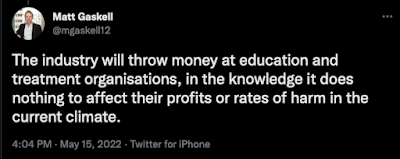Martin McKee and Mark Petticrew, two of the most inept 'public health' blowhards in Britain, have bumbled into the gambling debate with a letter in Lancet Psychiatry. McKee has form for talking rubbish about gambling, having been an opponent of the National Lottery way back in 1995. Neither he nor Petticrew have conducted any research into problem gambling, but they recognise that efforts to redefine gambling as a 'public health' issue offers them a new dragon to slay and new opportunities to write opinion pieces about industry websites masquerading as research (which is Petticrew's speciality).
Gambling harms have traditionally been viewed through the lens of psychiatry, psychology, and the neurosciences, with a focus on the individual gambler. This approach reflects an international research agenda that originated with the gambling industry and organisations that it has supported for almost 40 years. The ways in which this literature serves to pathologise people identified as so-called problem gamblers...
Bowden-Jones and colleagues propose a 1% levy on industry earnings to fund independent research. Although this funding would be a clear improvement on the current unsatisfactory system, in which voluntary contributions from the industry are channelled through GambleAware (a charity that both raises industry-derived funds and commissions research), the suggested levy is not a panacea. Linking the available funding to the earnings of the industry would create an obvious conflict of interest, because those involved might hesitate if their actions were to curb profits. We do not understand why public funding for gambling research should not be from government revenues, as is the case with any other threat to health.
This doesn't make much sense. Firstly, a levy would contribute to government revenues. Secondly, by the logic of 'public health' at least, if the industry makes less money (and therefore pays less via the levy) then there must be less gambling-related harm. Thirdly, are they seriously suggesting that researchers will refrain from offering effective solutions because the money will dry up somewhat? That would take a pretty unscrupulous and immoral academic. I believe this is known in psychology as projection.
So what do they propose instead? Insofar as they have a plan, it involves leaving problem gamblers to their fate while 'public health' grandees make pompous speeches about the 'commercial determinants of health' which is code for nutty anti-capitalist activism.
We call for a transformational change in how we conceptualise gambling harms, based on a public health framework that moves away from the current individualistic focus on so-called problem gamblers, takes seriously the upstream drivers of harm (eg, harmful business practices, products, and policies), and prioritises prevention of all forms of gambling harms, with funding mechanisms that are consistent with these goals.
Nothing much to worry about there, you might think. Just some bloke on Twitter who wrongly believes that treatment doesn't work.
But the bloke who thinks treatment doesn't work is the Clinical Lead & Consultant Psychologist for the NHS Northern Gambling Service. Presumably he'll be handing in his resignation in the morning.


No comments:
Post a Comment